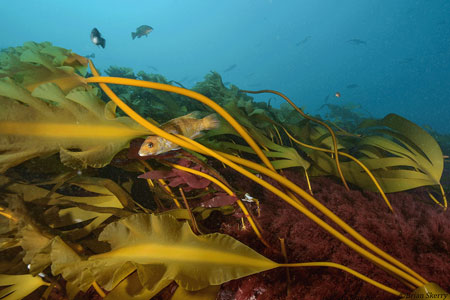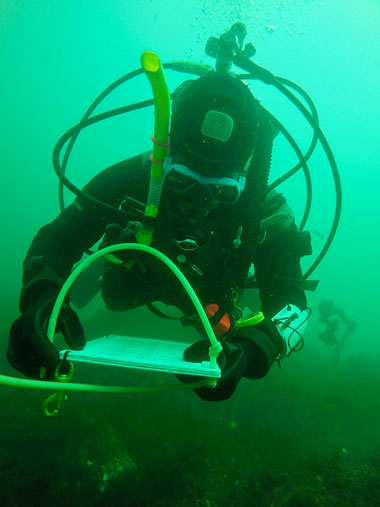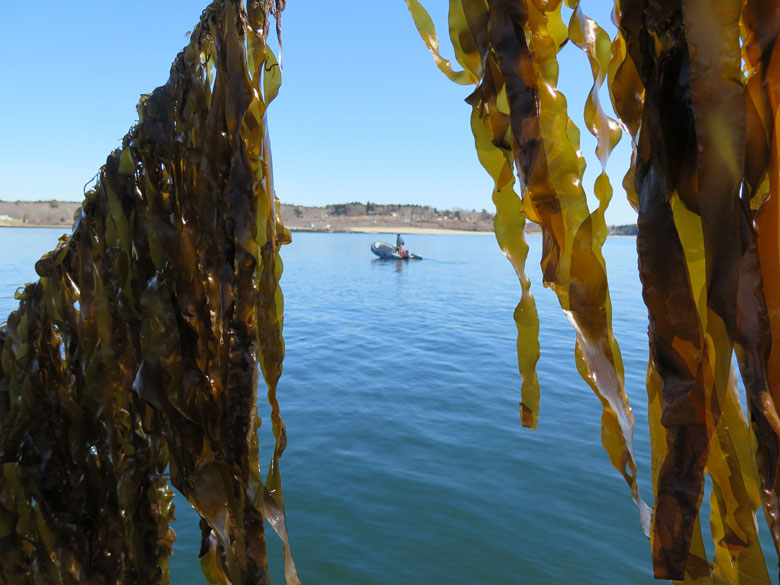Kelp forests are a foundational feature along Maine’s coastline, providing the food, habitat, and clean water needed for a rich marine ecosystem. But these forests are in flux due to changes in modern fisheries and, more recently, due to rapid warming.
A team of scientists led by Douglas Rasher, a senior research scientist at Bigelow Laboratory in East Boothbay, is illuminating those changes with the first in-depth census of Maine’s kelp forests in almost 20 years.

Their findings show the widespread collapse of forests along the southern coast but provide new evidence for the surprising resilience of kelp forests in eastern Maine, even as warming drives slow but significant declines there.
This research, made possible by funding from Maine Sea Grant and recently published in the journal Ecology, highlights just how much climate change is altering long-standing ecological relationships, as well as the importance of regional differences in how ecosystems may respond to ocean warming.
“I was floored by how dramatically the seaweed communities had changed and how much warmer coastal waters had become,” said Thew Suskiewicz, a former postdoctoral researcher at Bigelow Laboratory and the study’s first author.
“The more we sampled for this project, the more apparent those changes were and, sadly, I anticipate this is only the beginning.”
Scientists undertook several detailed dive surveys of kelp forests along more than 200 miles of coast.
Ecological theory and past observations suggest that kelp forests are controlled largely by changes in the relative populations of predators and prey in the food chain. In Maine, the collapse of fish populations like Atlantic cod led to a proliferation of kelp-eating sea urchins, which deforested the coast. Starting in the 1980s, though, a sea urchin fishery removed most of these voracious grazers from the ecosystem, allowing forests to recover along Maine’s coast by the early 2000s.
But kelp forests are now declining again, this time in response to a new threat—rapidly rising water temperatures.
The researchers combined several dive surveys of sea urchin and kelp populations with data on ocean temperature to model how and why kelp forests are changing—and how that varies along different parts of the coast. They found that temperatures have become inhospitable, in both the spring and summer, in the southern reaches of the Gulf of Maine where kelp forests have collapsed and been replaced by small filamentous red algae, which form a thick carpet of “turf” on the seafloor.
But they did find some cause for hope. While forests along Maine’s northeastern coast are also slowly declining, they still remain widespread there and continue to provide key ecosystem services. The researchers suggest that these regional differences in forest health, which hadn’t been previously documented, are due to the different ocean currents that run through the Gulf of Maine that make southern waters several degrees warmer during the summer.
“Ocean warming is impacting kelp forests throughout the Gulf of Maine, but absolute temperatures in the south are higher, so forests there have already reached their tipping point,” said Rasher. “The vast forests that still exist in the cooler, northern reaches of Maine, however, are likely to persist for decades, and should receive targeted management so they can continue to provide key ecosystem services.”

To draw out these important but subtle changes, scientists in Rasher’s lab undertook several detailed dive surveys of kelp forests along more than 200 miles of coast. They recreated the last in-depth kelp census completed in the early 2000s by Robert Steneck, another of the study’s co-authors and a professor emeritus at University of Maine.
Those data were, in turn, combined by Jarrett Byrnes, a co-author from University of Massachusetts Boston, with information on temperature and almost 20 years of annual survey data collected by the Maine Department of Marine Resources to track sea urchins.
“Datasets that cover both this much space and time in this habitat are exceedingly rare,” Byrnes said. “This dataset is unique in the Gulf of Maine and tells a fascinating story about climate change in our nearshore waters. It gives us the power to understand the impacts of global change with nuance and precision in a wholly unique way.”
These findings also have implications for kelp forest management and where resource managers target restoration and monitoring.
“By linking the broad-scale patterns that a generalist survey like DMR’s picks up with the detailed, species-specific information, you create a powerful dataset,” said Carl Wilson, director of the Bureau of Marine Sciences at DMR.
“This sea urchin survey is emerging as one of the unique surveys in the Gulf of Maine to document the effects of climate change, as is reflected in this paper,” Wilson said. “For all of our surveys, but especially this one, we’re thinking about how we adapt them for broader ecological monitoring.”
At Bigelow Laboratory, the research has also catalyzed a series of projects examining how species are shifting in response to changing conditions and what impact that’s having on the broader ecosystem. Rasher and his research team have continued to track changes within Maine’s kelp forests, with a focus on revealing the impacts of kelp loss on the broader ecosystem, from microbes to large fish.
“Ecological theory predicts that when you bring herbivores under control, kelp forests should flourish, but what we found is that climate change has rewritten the rules in this system,” Rasher said. “We need to adjust the way in which we conduct science, the questions we ask, and the way we manage resources if we’re going to understand and adapt to our changing oceans.”
Leah Campbell is science communications manager at Bigelow Laboratory for Ocean Sciences in East Boothbay. This story first appeared on Bigelow’s website and is reprinted with permission and gratitude.





